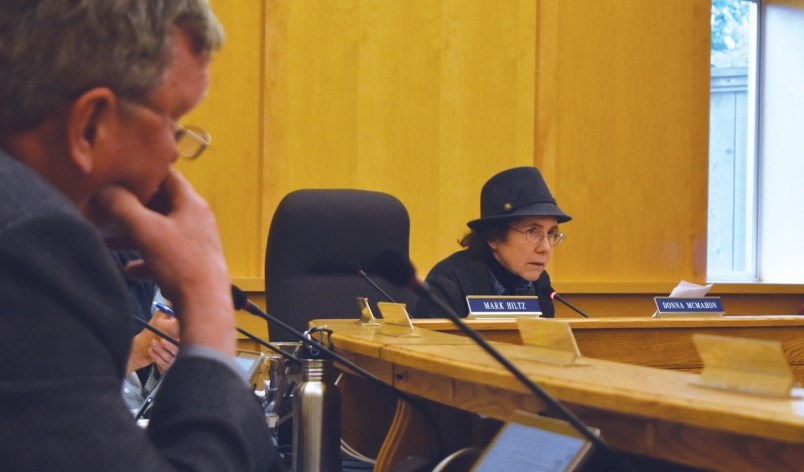Sunshine Coast Regional District (SCRD) directors awarded a $239,980 contract for the phase-four raw water reservoir feasibility study after putting the decision on hold until they could gather more information.
The contract was awarded at an April 9 board meeting to Integrated Sustainability Consultants Ltd. – the same company that conducted the previous phases.
Phase four would result in a more detailed geotechnical analysis and updated cost estimate.
Currently, the cost of developing “Site B” into a reservoir is $53 million, with completion expected as early as 2025. The cost estimate is conservative, according to staff, because there isn’t enough information about soil composition and depth of bedrock at the site location near the Chapman Creek water treatment plant and east of the Lehigh gravel mine.
Directors were expected to approve the contract at a March 26 board meeting, but instead deferred making the decision to a future board meeting, asking staff to explain the implications of suspending the study as they sought ways to lower the 2020 tax increase to relieve pressure caused by COVID-19.
During the April 9 discussion, chief financial officer Tina Perreault said if the project was suspended, the impact on user fees “wouldn’t be realized until the next year.”
Infrastructure services general manager Remko Rosenboom said delaying the study could lead to higher costs down the road and in the meantime, other land use applications could be approved that would take the site off the table.
Another risk is the potential loss of an important partnership.
According to the April 9 staff report, the SCRD is planning to work with shíshálh Nation’s mining consultant to determine the value of the excavated material in case it can be sold to offset project costs. Rosenboom said the consultant could lose interest in the project, and “they are essential in determining the economic value of the excavated materials.”
Additionally, staff recommended moving ahead with the study since a more accurate estimate could be compared with cost estimates of potential wells, which are also expected later this year.
Elphinstone director Donna McMahon, who moved to defer the decision at the March 26 meeting, remained opposed to the project. It should be suspended, she said, until they reassess the Comprehensive Regional Water Plan, a guiding document published in 2013 which McMahon said doesn’t account for the impacts of climate change on the water system.
“Our climate emergency requires us to change virtually everything we do, which is why I think we need to reconsider all of our spending,” she said at the April 9 meeting. She argued the money, which would come out of operating reserves, is better spent elsewhere.
“We are treating projects funded from reserves as if they are free because we don’t have to raise taxes, but our reserves are precious. We don’t know when we’ll be able to replenish them and in the meantime we have critical infrastructure needs.”
Her arguments didn’t convince other directors, however.
Roberts Creek director Andreas Tize sympathized with McMahon but opted to move ahead with phase four: “We’re still a long ways away from approving a reservoir but it would be good to get a holistic picture of the whole thing.”
Area A director Leonard Lee also supported the study. “I think we need to finish this and understand the true costs and make a decision from there.”
West Howe Sound director Mark Hiltz said he was “totally supportive” of the project, since it would count as diversifying water sources.
And while Sechelt director Alton Toth objected to that point, since the reservoir would still draw from the Chapman Creek watershed, he too voted in favour of awarding the contract to get “an apples to apples comparison,” and because it could open up opportunities for infrastructure grants.
He also wanted to pursue the study because it’s what some constituents are asking for.
“Frankly, we have a lot of people in the community that want to see a reservoir move forward, costs be damned, and I think it’s only fair that we get those costs and that information in hand to help educate our decisions.”
Findings are anticipated between July and November of this year.



